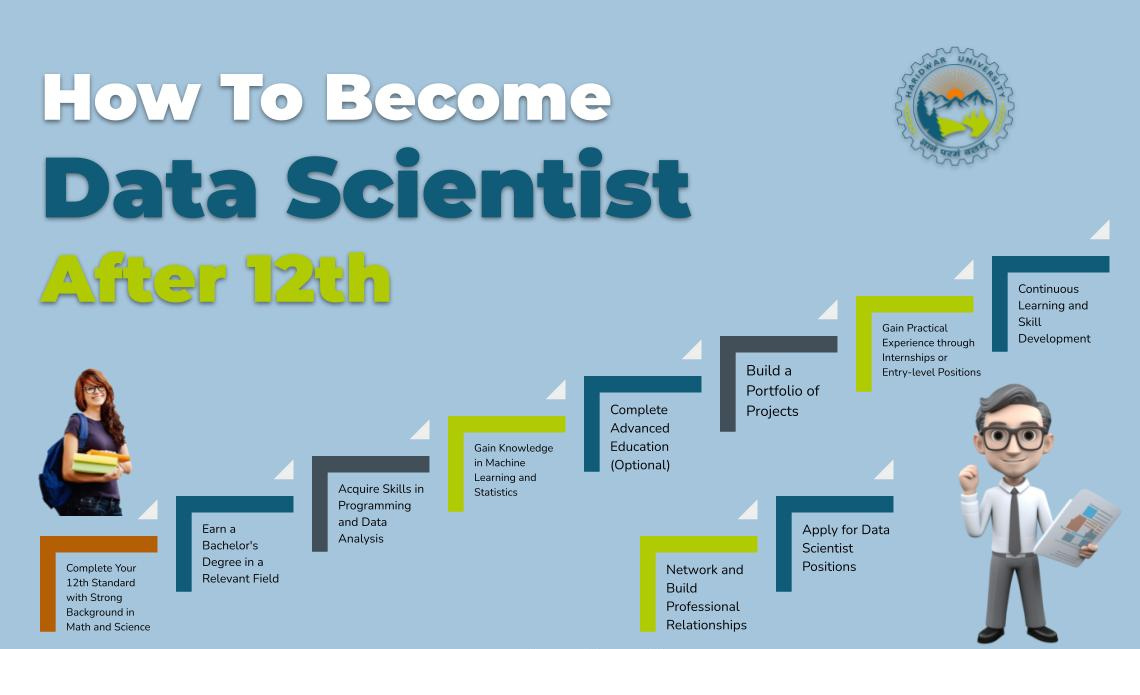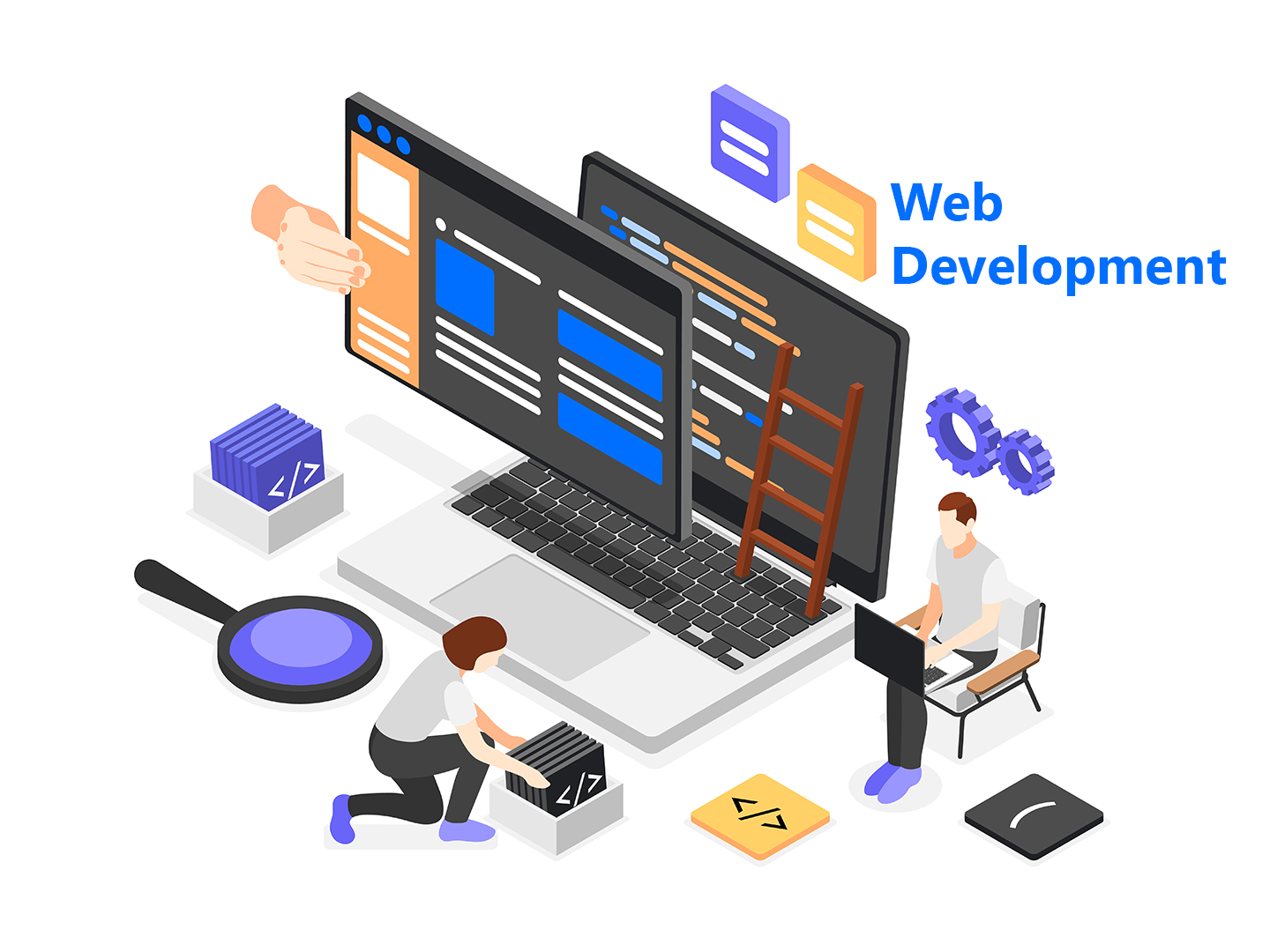In today's data-driven world, the role of a data scientist is not just a job; it's a gateway to one of the most exciting and rapidly growing fields. If you are fascinated by numbers, analytics, and technology, and you've just completed your 12th grade, you might be wondering how to embark on the journey to become a data scientist. This guide will walk you through the steps, qualifications, and skills required to pursue a successful career in data science, starting right after your 12th grade.
What Is Data Science?
Data science is a multidisciplinary field that uses scientific methods, algorithms, and systems to extract knowledge and insights from structured and unstructured data. It combines aspects of statistics, computer science, and domain expertise to analyze data and provide actionable insights. Data scientists play a crucial role in helping organizations make data-driven decisions.
Why Choose Data Science as a Career?
Before diving into the steps to become a data scientist, let's explore why this career is worth pursuing.
- High Demand: Data science is one of the most sought-after professions, with a growing demand for skilled professionals across industries.
- Lucrative Salary: Data scientists are among the highest-paid professionals in the tech industry, with competitive salaries and benefits.
- Diverse Opportunities: From healthcare to finance, e-commerce to entertainment, data scientists have the flexibility to work in various sectors.
- Constant Learning: The field is ever-evolving, offering continuous opportunities for learning and professional growth.
- Impactful Work: Data scientists help organizations solve complex problems, optimize operations, and drive innovation.
Step 1: Choose the Right Stream in 12th Grade
The first step towards becoming a data scientist starts in high school. Opting for the right subjects in your 12th grade can set a strong foundation for your future studies in data science.
- Science Stream: Choosing the Science stream with Mathematics and Computer Science as major subjects is highly recommended. Physics, Chemistry, and Mathematics (PCM) or Physics, Chemistry, Mathematics, and Computer Science (PCMC) will provide you with the analytical and computational skills needed for data science.
- Commerce Stream: If you are from the Commerce stream, focusing on subjects like Mathematics, Economics, and Computer Applications can also be beneficial.
- Humanities Stream: While less common, students from the Humanities stream can still pursue data science by focusing on subjects like Economics, Mathematics, and Statistics.
Step 2: Pursue a Relevant Undergraduate Degree
After completing your 12th grade, the next crucial step is to pursue a relevant undergraduate degree that aligns with your goal of becoming a data scientist.
- Bachelor's in Computer Science (B.Sc./B.Tech): This is one of the most popular choices for aspiring data scientists. The curriculum covers programming, algorithms, data structures, and more, providing a strong technical foundation.
- Bachelor's in Data Science: Some universities now offer specialized undergraduate programs in data science. These courses are designed to provide a comprehensive understanding of data analysis, machine learning, and data visualization.
- Bachelor's in Statistics or Mathematics: These programs focus on the statistical and mathematical principles underlying data science. They are ideal for students who want to specialize in data analysis and predictive modeling.
- Bachelor's in Economics: If you have a strong interest in the economic aspects of data, a degree in Economics can also be a good starting point. It provides insights into market trends, financial analysis, and econometrics.
Step 3: Learn Essential Programming Languages
Programming is a critical skill for data scientists. During your undergraduate studies, or even before, you should focus on learning key programming languages used in data science.
- Python: Python is the most widely used programming language in data science. It is known for its simplicity, versatility, and extensive libraries like Pandas, NumPy, and Scikit-learn, which are essential for data analysis and machine learning.
- R: R is another popular language in the data science community, particularly for statistical analysis and visualization. Learning R will enhance your ability to handle complex data sets.
- SQL: Structured Query Language (SQL) is used for managing and querying databases. Proficiency in SQL is crucial for data extraction and manipulation.
- Java/Scala: While not as common as Python or R, knowledge of Java or Scala can be beneficial, especially if you're interested in big data technologies like Apache Hadoop and Apache Spark.
Step 4: Gain Practical Experience Through Internships and Projects
Hands-on experience is vital to becoming a successful data scientist. While theoretical knowledge is important, practical skills are what set you apart in the job market.
- Internships: During your undergraduate studies, seek internships in data science or related fields. Internships provide real-world experience, allowing you to apply your knowledge to solve actual business problems.
- Projects: Work on personal or academic projects that involve data collection, analysis, and visualization. Projects can include anything from analyzing social media trends to predicting stock market prices.
- Online Competitions: Participate in data science competitions on platforms like Kaggle. These competitions are a great way to challenge yourself and showcase your skills to potential employers.
Step 5: Consider Higher Education and Certifications
While a bachelor's degree may be sufficient to start your career, pursuing higher education or certifications can significantly enhance your prospects.
- Master's in Data Science/Analytics: A master's degree in data science, data analytics, or a related field can provide advanced knowledge and open doors to higher-level positions. These programs often include coursework in machine learning, big data, and advanced statistical methods.
- Online Certifications: Numerous online platforms offer certifications in data science, machine learning, and AI. Certifications from recognized institutions can boost your resume and demonstrate your commitment to continuous learning.
- Specialized Bootcamps: Data science bootcamps are intensive, short-term programs designed to equip you with practical skills. They are ideal for those who want to transition into data science quickly.
Step 6: Develop Key Skills for Data Science
Becoming a data scientist requires more than just technical knowledge. You need a combination of hard and soft skills to succeed in this field.
- Analytical Thinking: Data scientists must be able to analyze complex data sets and extract meaningful insights. Developing strong analytical skills is crucial.
- Problem-Solving: Data science is all about solving real-world problems using data. Being a creative and effective problem solver will help you stand out.
- Communication Skills: Data scientists often need to present their findings to non-technical stakeholders. Clear and concise communication is key to ensuring your insights are understood and acted upon.
- Domain Knowledge: Understanding the industry you work in, whether it's finance, healthcare, or marketing, is essential for applying data science effectively.
Step 7: Build a Strong Portfolio
A well-curated portfolio is your showcase to potential employers. It should highlight your best work and demonstrate your proficiency in data science.
- GitHub Repository: Create a GitHub repository to share your code, projects, and contributions to open-source projects. A well-maintained GitHub profile can impress employers and showcase your coding skills.
- Personal Blog/Website: Start a blog or personal website where you can write about data science topics, share your projects, and offer tutorials. This not only enhances your online presence but also establishes you as a thought leader in the field.
- LinkedIn Profile: Keep your LinkedIn profile updated with your latest skills, certifications, and projects. Connect with professionals in the data science community and engage with relevant content.
Step 8: Apply for Data Science Roles
With a solid educational background, practical experience, and a strong portfolio, you're ready to apply for data science roles. Start by searching for entry-level positions such as:
- Data Analyst: Data analysts focus on interpreting data and providing actionable insights. This role is a common entry point into the data science field.
- Junior Data Scientist: As a junior data scientist, you'll work under the guidance of senior data scientists, helping with data collection, analysis, and model development.
- Business Intelligence Analyst: BI analysts use data to help organizations make strategic decisions. This role requires a strong understanding of data visualization tools and business acumen.
- Machine Learning Engineer: If you're inclined towards machine learning, consider starting as a machine learning engineer. This role involves developing algorithms and models to solve specific problems.
Step 9: Stay Updated with Industry Trends
The field of data science is constantly evolving. To remain competitive, it's important to stay updated with the latest trends, tools, and technologies.
- Continuous Learning: Enroll in online courses, attend webinars, and read industry publications to keep your knowledge current.
- Networking: Join data science communities, attend conferences, and participate in meetups to connect with professionals and stay informed about industry developments.
- Experiment with New Tools: Regularly explore new tools and technologies in data science. Experimenting with different tools will keep your skills sharp and relevant.
Step 10: Keep Improving and Advancing in Your Career
Becoming a data scientist is not the end of the journey; it's just the beginning. To advance in your career, continue to hone your skills, take on challenging projects, and aim for higher positions such as:
- Senior Data Scientist: As a senior data scientist, you'll lead data science teams, manage projects, and work on more complex problems.
- Data Science Manager: This role involves overseeing data science teams and ensuring the successful
execution of projects. 3. Chief Data Officer (CDO): The CDO is responsible for the overall data strategy of an organization. This executive-level position requires extensive experience and leadership skills.
FAQs
Q1: Is it possible to become a data scientist directly after 12th grade?
A1: While you cannot become a data scientist immediately after 12th grade, you can start preparing by choosing the right subjects, pursuing a relevant degree, and gaining practical experience through internships and projects.
Q2: What subjects should I choose in 12th grade to become a data scientist?
A2: Opt for the Science stream with Mathematics and Computer Science as major subjects. If you are from the Commerce stream, focus on Mathematics, Economics, and Computer Applications.
Q3: Which degree is best for becoming a data scientist?
A3: A Bachelor's in Computer Science, Data Science, Statistics, Mathematics, or Economics are all good choices. Specialized data science programs are also available at some universities.
Q4: Do I need to learn programming to become a data scientist?
A4: Yes, learning programming languages like Python, R, and SQL is essential for data science. These languages are used for data analysis, machine learning, and database management.
Q5: Are internships important for becoming a data scientist?
A5: Yes, internships provide valuable practical experience, allowing you to apply theoretical knowledge to real-world problems. They also enhance your resume and improve your job prospects.
Q6: Should I pursue higher education after a bachelor's degree?
A6: While not mandatory, pursuing a master's degree or certifications in data science can significantly enhance your career prospects and open doors to higher-level positions.
Q7: What skills are essential for a data scientist?
A7: Key skills include analytical thinking, problem-solving, communication, programming, and domain knowledge. Developing these skills will help you succeed in the field.
Q8: How can I build a strong portfolio for data science?
A8: Create a GitHub repository to showcase your code, work on personal projects, start a blog or website, and maintain an updated LinkedIn profile to highlight your skills and experience.
Q9: What are the entry-level roles for aspiring data scientists?
A9: Common entry-level roles include Data Analyst, Junior Data Scientist, Business Intelligence Analyst, and Machine Learning Engineer. These roles provide a good starting point for your career.
Q10: How can I stay updated with trends in data science?
A10: Continuous learning, networking, attending conferences, and experimenting with new tools are effective ways to stay informed about the latest trends in data science.

 Best Mobile App Development Company in Delhi NCR | Oprezo India
Best Mobile App Development Company in Delhi NCR | Oprezo India Top Web Development Services in Delhi/NCR | Oprezo India – React JS, Angular JS, eCommerce & More
Top Web Development Services in Delhi/NCR | Oprezo India – React JS, Angular JS, eCommerce & More Top Mobile App Development Company in Delhi / NCR | Oprezo India
Top Mobile App Development Company in Delhi / NCR | Oprezo India Mobile App Development in Delhi - Android, iOS, Hybrid & Flutter | Oprezo India
Mobile App Development in Delhi - Android, iOS, Hybrid & Flutter | Oprezo India Why Oprezo India is the Best Web Development Partner in Delhi NCR?
Why Oprezo India is the Best Web Development Partner in Delhi NCR?